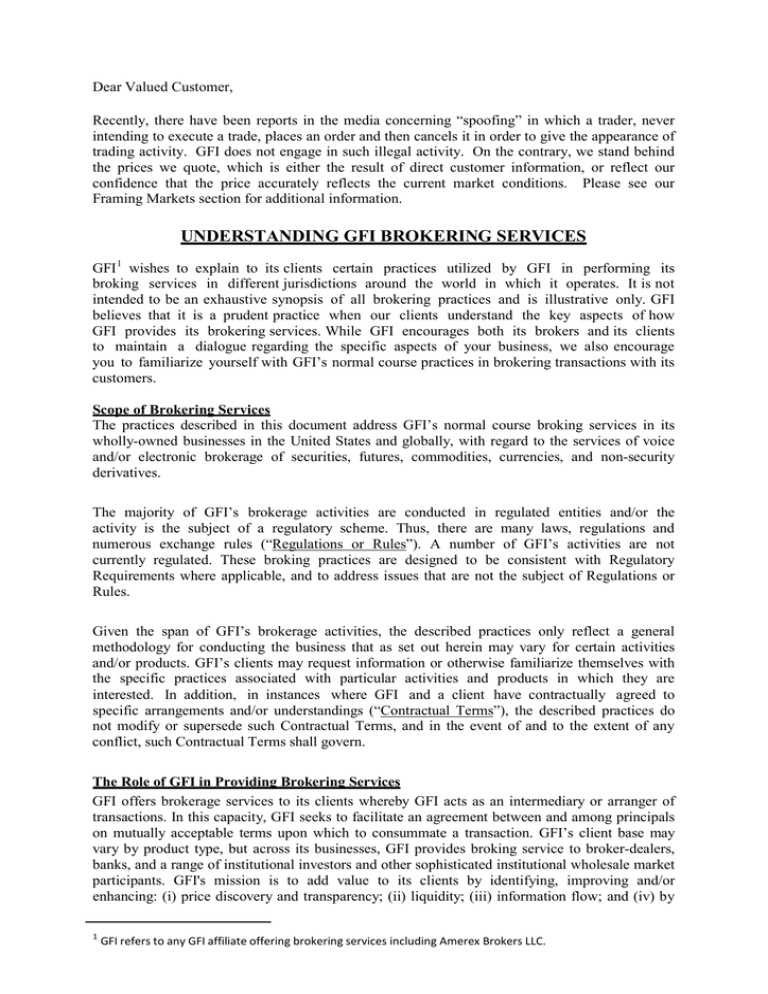understanding gfi brokering services
advertisement

Dear Valued Customer, Recently, there have been reports in the media concerning “spoofing” in which a trader, never intending to execute a trade, places an order and then cancels it in order to give the appearance of trading activity. GFI does not engage in such illegal activity. On the contrary, we stand behind the prices we quote, which is either the result of direct customer information, or reflect our confidence that the price accurately reflects the current market conditions. Please see our Framing Markets section for additional information. UNDERSTANDING GFI BROKERING SERVICES GFI 1 wishes to explain to its clients certain practices utilized by GFI in performing its broking services in different jurisdictions around the world in which it operates. It is not intended to be an exhaustive synopsis of all brokering practices and is illustrative only. GFI believes that it is a prudent practice when our clients understand the key aspects of how GFI provides its brokering services. While GFI encourages both its brokers and its clients to maintain a dialogue regarding the specific aspects of your business, we also encourage you to familiarize yourself with GFI’s normal course practices in brokering transactions with its customers. Scope of Brokering Services The practices described in this document address GFI’s normal course broking services in its wholly-owned businesses in the United States and globally, with regard to the services of voice and/or electronic brokerage of securities, futures, commodities, currencies, and non-security derivatives. The majority of GFI’s brokerage activities are conducted in regulated entities and/or the activity is the subject of a regulatory scheme. Thus, there are many laws, regulations and numerous exchange rules (“Regulations or Rules”). A number of GFI’s activities are not currently regulated. These broking practices are designed to be consistent with Regulatory Requirements where applicable, and to address issues that are not the subject of Regulations or Rules. Given the span of GFI’s brokerage activities, the described practices only reflect a general methodology for conducting the business that as set out herein may vary for certain activities and/or products. GFI’s clients may request information or otherwise familiarize themselves with the specific practices associated with particular activities and products in which they are interested. In addition, in instances where GFI and a client have contractually agreed to specific arrangements and/or understandings (“Contractual Terms”), the described practices do not modify or supersede such Contractual Terms, and in the event of and to the extent of any conflict, such Contractual Terms shall govern. The Role of GFI in Providing Brokering Services GFI offers brokerage services to its clients whereby GFI acts as an intermediary or arranger of transactions. In this capacity, GFI seeks to facilitate an agreement between and among principals on mutually acceptable terms upon which to consummate a transaction. GFI’s client base may vary by product type, but across its businesses, GFI provides broking service to broker-dealers, banks, and a range of institutional investors and other sophisticated institutional wholesale market participants. GFI's mission is to add value to its clients by identifying, improving and/or enhancing: (i) price discovery and transparency; (ii) liquidity; (iii) information flow; and (iv) by 1 GFI refers to any GFI affiliate offering brokering services including Amerex Brokers LLC. providing pre- and/or post-trade anonymity and/or confidentiality appropriate to the relevant marketplace. GFI does not serve as a fiduciary to its clients. In addition, in the absence of Regulations or Rules, when a client utilizes GFI to provide broking services, including in situations when the client is the only party to the transaction that pays GFI for services, GFI does not act exclusively for the benefit of that client. In certain cases where GFI is sourcing liquidity and facilitating transactions, GFI will unavoidably be working with multiple clients whose interests might be in conflict with regard to the outcome of a particular transaction, GFI accommodates the interests of multiple participants involved in a particular transaction, as well as to act in a manner that furthers the interests of all participants in conducting an ongoing business in the relevant marketplace, but may not always meet the precise criteria of any particular participant. As an institutional or broker-dealer customer, GFI has limited obligations as it pertains to suitability. Unless otherwise explicitly agreed, you are held to not have relied on GFI to determine the appropriateness of the product, its features and risk to your portfolio. Additionally, you should independently verify all aspects of the product you buy – for example, price, quantity, yield, rating and call and put right. For stock sales, you should also be aware of dividend and exdates and should be independently aware of correct price adjustments due to these events. Capacities in which GFI Acts: GFI provides brokerage services in three capacities, depending upon the nature of the particular product – the titles for each type of capacity are descriptive and customers may use different descriptions: “Exchange Give Up” Capacity. For certain products, GFI acts in an agency capacity whereby it facilitates the trading activity of its client on an exchange (e.g. ICE Futures Europe, Eurex, CME etc). Upon receiving the relevant price information from GFI, the client will instruct GFI to place an order on the appropriate exchange, either in its own name (if a member of the exchange) or through a third party. Once the execution has occurred, the executed position is then “given-up” to the client through the clearing services at the exchange clearing house. Commonly, the arrangement will be governed by an industry standard “give-up” agreement. A derivation of this business model is where the OTC trades are crossed (where prior negotiation of the price between two parties can occur) on the exchange to provide the clients with a settlement process through a central counterparty. At the end of each month, GFI will invoice the client for the trading activity during that month. “Matched Principal” Capacity. For certain products, GFI acts in the capacity of a “matched or riskless principal”; it acts as an intermediary by serving as the counterparty for identified buyers and sellers in matching, in whole or in part, reciprocal back-to-back trades. Settlement is made between each client based on the market convention with the brokerage fee, being either incorporated in the all-in price passed to the client or through a monthly invoice. "Principal Capacity". For certain products the firm may upon occasion commit capital to facilitate a customer's order prior to accessing the liquidity in the market place. Such activity is intended, among other things, to assist these parties in managing their proprietary positions, and to facilitate transactions, add liquidity, and attract additional order flow to our marketplaces. “Name Passing” Capacity. For certain products, GFI takes on an arranging role in a transaction between two or more counterparties. A broker, via price dissemination, distributes quotations to other market participants presenting both price and volume. For voice brokered products, the presented prices and volumes: 1) are dependent upon market convention; 2) either firm or indicative levels of interest; and 3) must be confirmed prior to any transaction being deemed completed. For electronically executed products the prices and volumes are typically deemed firm and are traded without further confirmation. Generally when all terms, other than credit approval, are met, the counterparties’ names are disclosed and the broker “steps away” from the transaction. Bilateral agreements are then entered between the counterparties and the broker will invoice the brokerage fee. Circumstances Under Which GFI May Act as Principal and its Handling of Any Resulting Positions GFI does not generally engage in proprietary trading as it does not systematically initiate or carry positions for its own account solely for the purpose of putting its capital at risk or to earn a profit based on a view of the market. However, GFI may and does from time to time, acquire unmatched positions as principal in the following scenarios: - On occasion, as a result of a bona fide error, GFI may in “Matched Principal” or exchange-based “Name give up” marketplaces acquire a position in resolution of an error or out trade. - Facilitation and execution of an order on behalf of a client prior to a position’s novation, give-up or settlement by the relevant client and/or for the purpose of intermediating a client’s access to any applicable clearing and settlement system. - The firm may occasionally commit capital to facilitate a customer's order prior to accessing the liquidity in the market place. - When facilitating a customer transaction in a “matched principal” marketplace, GFI may assist the transaction by framing a market. When framing a market in a “matched principal” marketplace, GFI may post or provide live, executable bids and offers at minimum acceptable quantities in an effort (i) to present suitable markets where none exist, or (ii) to exhibit spreads that are more reflective of contemporaneous market opinion. In such cases, GFI’s efforts are intended to assist its customers in managing their proprietary positions, to facilitate liquidity for GFI customers and to draw market participants to participate in a transaction. In some cases, GFI may acquire a position as principal on an unmatched trade as of result of posting or providing quotations in this manner. When GFI acquires a position in the aforementioned circumstances, it will close, manage and mitigate the risk associated with that position in a timely fashion. Accordingly, GFI seeks to liquidate or hedge such positions as soon as reasonably practicable by accessing all suitable and obtainable markets and in accordance with the Regulations or Rules. Price Discovery and Trading Priority Electronic Marketplaces. For electronic marketplaces as well as for hybrid marketplaces that permit customers to transact either with a voice broker or through the electronic system, the price discovery process takes place through information posted on the electronic screens. Voice Brokered Marketplaces. In voice brokered marketplaces, price discovery is generally accomplished over telephone lines, through electronic price dissemination screens and other electronic communication tools. In certain situations, GFI will seek to locate the contra side of a transaction based on a firm request from a client that includes some or all of the order parameters that the client would agree to transact (i.e., price, transaction size). In other situations, GFI may be asked or expected to work a contingent order. In those cases, it is understood and expected that in facilitating the client’s transaction, GFI may need to adjust the contingent order to reflect changes in the price of, or shifts in the curves relating to, underlying instruments or indices with which the instrument(s) (that is the subject of the order), correlate. In some cases, GFI may on an arms-length basis seek out price discovery from competing wholesale market brokers in order to facilitate a customer’s trading interest. Complete counterparty details for trades executed with the involvement of competing brokers are usually disclosed at the time of a transaction. For certain products and order types, applicable Regulations or Rules may mandate the manner and priority of a given execution. For other products and order types, where the client gives GFI indications of interest rather than actual orders, GFI does not take on any obligation to satisfy any client’s interest in whole or in part, regardless of whether such order or indication could have been satisfied. For example, on many trades GFI is necessarily working with multiple clients whose interests may be in conflict as to price and volume, and there may be more interest in a particular transaction than can be satisfied by the volume of interest on the other side of that transaction. It is thus frequently the case that the circumstances around a particular transaction may make GFI unable to meet the interests of each of its customers to their optimal level. Subject to applicable Regulations or Rules, GFI reserves the right in its discretion to determine how to prioritize allocations of executions so long as it does not unfairly prejudice a client. Each of GFI’s voice brokered marketplaces operate in a manner consistent with general market practices that address issues such as the entitlements of the aggressor (e.g., the “price taker”) with regard to counteroffers, the prioritization of clients responding to an aggressor, the ability of clients to join existing bids or offers, time/price/size prioritization, and the ability of a client to participate in a given transaction. These practices may vary from product to product. While GFI reserves the right without prior notice to depart from the established market protocols in any and all situations, its normal interest and intent is to employ those practices on a regular and consistent basis. GFI encourages its clients to familiarize themselves with the typical priority practices utilized in a particular marketplace, and to raise any questions they may have in that regard. GFI Compensation Models GFI is chiefly compensated for its role in facilitating and completing transactions by charging its customers a brokerage fee. In a “Name Give Up” context, the fee will typically take the form of an invoiced commission. In a “Matched Principal” context, the fee will typically take the form of a markup or markdown which is added to or subtracted from, as the case may be, the agreed-to transaction price. For certain products, a brokerage fee may be paid by both participants (buyer and seller) in the transaction. For other products, the brokerage fee is paid by one of the participants in the trade. Sometimes the participant that pays will be the liquidity provider, and sometimes it will be the liquidity taker. In certain cases, the brokerage fee paid to GFI may deviate from the normal rate due to the level of service provided, e.g. time spent, cost of executing etc. GFI may receive revenue from other means besides a fee. For example, GFI may acquire positions in certain situations and in connection with doing so and in managing and liquidating such positions, it may earn a profit or a loss. As noted, GFI does not engage in such activities with the intent to make a profit, and expects the net result of any such activities will be modest gains or losses. In addition, in certain fixed income markets, where not contrary to Regulations and Rules, GFI may when acting in a “matched principal” capacity earn a profit by buying a financial instrument at one price and simultaneously or shortly thereafter selling it at a higher price (or vice versa), such that GFI receives the benefit of the “spread” on the trade in addition to any markup or markdown it charges. Extent of Anonymity or Disclosure As a general rule, GFI seeks to operate each of its different product marketplaces in an anonymous fashion. Except as noted below, GFI believes that liquidity and transparency in the marketplace are best served when it maintains its client’s confidentiality and anonymity. In “matched principal” marketplaces, GFI generally seeks to employ reasonable efforts to maintain the confidentiality and anonymity of the identity of customers involved in or contemplating participating in a transaction. Similarly, in “name give-up” markets, GFI seeks to employ reasonable efforts to maintain anonymity during the pre-matching period. During the post-trade period, it will generally disclose the identity of a client participating in a trade only to the other participants in that trade (except as described below). GFI asks that its customers respect and honour this level of confidentiality and anonymity by not seeking or requesting information that may not be shared. There are two situations in which the aforementioned level of anonymity may not apply, both of which are limited to marketplaces that are not fully electronic. 1) There may be situations where the identity or creditworthiness of a client is a material term of a potential transaction. In those cases, GFI reserves the right without prior notice to disclose the identity of a client to the extent it reasonably believes such information could constitute a material term for another party contemplating participating in such a transaction. 2) With regard to certain non-securities marketplaces, clients through custom and course of dealings participated in those markets with the expectation that identifying information about those participating or contemplating participating in a particular transaction would be available upon request. In such markets, GFI seeks to accommodate that preference, and to make information available on a consistent and neutral basis when asked. GFI encourages its clients to familiarize themselves with the confidentiality and anonymity standards applicable to particular marketplaces and/or products they participate in, and to raise any questions or issues they may have in that regard, and to express their views and preferences to GFI. Publication of Off Screen Trades For certain products, GFI provides both voice brokerage and electronic brokerage services (“hybrid markets”). In hybrid markets, when a transaction is arranged through or executed with a voice broker, GFI is able to publish a record of that transaction on the screen utilized for electronic brokerage of that product so that it is made available to other participants in the marketplace. In the absence of a request from its client not to publish the transaction, GFI may publish the record of such transactions on its electronic screen. GFI recognizes that its clients may in certain situations prefer that such transactions not be published on the screen, and when requested to refrain from such publication for voice executed transactions, GFI will seek to honour its client’s request to the extent practicable, and to the extent that other participants in the transaction agree to the request. In situations where all parties agree, information regarding that transaction will not be posted on the screen, nor included in any market data feed compiled and supplied by GFI, but GFI will upon request provide oral information regarding the occurrence of the transactions and its terms. Requests For Indicative Valuations From time to time, in response to client requests or on its own initiative, GFI may provide or publish information expressing a view of an indicative valuation of a particular financial product. These indicative valuations reflect GFI’s good faith view as to a reasonable indication for that particular product, assuming an institutional market normal market size, and the absence of unusual market conditions, such as distressed selling. GFI does not accept liability for the completeness or accuracy of any such indicative valuations, nor does GFI commit that the parties would or will be able to transact at the levels indicated. All such valuations are subject to any disclosure and disclaimer language that accompanies them and GFI’s then prevailing terms of use. GFI will typically provide such valuations based on the transactional activity that it participates in, though GFI may provide valuations based on transactional activity that takes place away from GFI if GFI reasonably believes that activity to have occurred. Framing Markets From time to time, in response to client requests or on its own initiative, GFI may provide quotes to frame a market. These quotes are intended to provide prices where the firm believes a customer can execute a transaction in a particular financial product. These quotes reflect GFI’s good faith view as to a reasonable bid/offer for that particular product. Prices may be received directly from a customer, or GFI may provide prices where GFI is confident the customers will be able to execute a trade, but does not have a customer currently supporting the price. In these cases the price will be based on GFI’s professional judgment. When framing a market in a “name passing” marketplace, GFI may post or provide bids and offers in an effort (i) to present suitable markets where none exist, or (ii) to exhibit spreads that are more reflective of contemporaneous market opinion or activity. In such cases, GFI’s efforts are intended to facilitate liquidity for GFI’s customers and to draw market participants to participate in a transaction. Although GFI will exercise best efforts to honor a price, GFI cannot guarantee a party will be able to execute at a certain level. GFI will typically provide such prices based on the following factors including but not limited to: previously executed transactions; executable or indicative bids or offers received by the firm; historical prices on where the firm had executed transactions or had received executable or indicative bids or offers; transactional activity that takes place away from GFI if GFI reasonably believes that activity to have occurred; the views of active market participants or from prices derived from transactions, executable or indicative bids in a similar product. Prices are not firm unless otherwise specified. Volume Match Volume Match is an anonymous auction-style trading system, which provides customers with efficient price discovery, order management and execution in many products brokered by GFI. Volume Match may be run at specific times or continuously during the day where customer orders can be matched at firm set price levels (“Volume Match Price”). Determination of the Volume Match price shall include any one or a combination of a number of inputs at the discretion of the firm. They include prices of transactions, executable or indicative bids or offers or historical prices at GFI or in other markets; prices derived from transactions, executable or indicative bids or offers or historical prices at GFI or in other markets; and views of active market participants. Derived Prices Where prices and/or executable or indicative bids or offers are unavailable f o r t h e p r o d u c t s u b j e c t t o t h e V o l u m e M a t c h , the firm may apply analytical analysis to prices, executable or indicative bids or offers, or historical price information for a similar product traded by the firm, or in another market to determine the Volume Match price. The Firm also may apply analytics where bids or offers are available but because of the width of the bid/offer spread or other factors, the Volume Match price may be ambiguous and the application of such analytics would provide additional clarity. Such analytical analysis may include, for example, but is not limited to, empirical cash flow valuations using Libor, Euribor and Overnight Interest Rate bootstrapped Discount Factor curves and forward forecasting curves, credit adjustment and valuation models and options modelling using, but not limited to, industry standard Black Scholes, adjusted Black Scholes (Garman Kohlhagen) and Stochastic Options models on specific option structures. Market Participant Views The Firm may also request the views of active market Participants and consider such views in determining the proposed Volume Match Price. In requesting the views of active market Participants, the Firm must act fairly in determining which active market Participants to survey; must weigh the views of market Participants based on market conditions and not on factors unrelated to the Participant’s assessment of market conditions, and shall not knowingly ask for or receive a market view intended solely to favor the market Participant’s position; shall not attempt to coerce or pressure an active market Participant to respond to the request for their views or to alter a view once it has been expressed; and shall not divulge any information regarding the positions or intentions of any other Participant without the consent of such Participant. In using responses from active market Participants as an input in the determination of the proposed Volume Match price, the Firm shall use its best efforts, acting in good faith, to disregard any prices that are outliers from the consensus view expressed. Oral, written and any other verbal communications may be recorded and retained as required or otherwise. SEF Transactions All Swap transactions involving a US person will be executed on a SEF. Trades arranged by the firms introducing brokers are not executed until they have been submitted and executed on a SEF. GFI reserves the right to amend and depart from industry broking practices at any time, and without prior notice. The broking practices herein are not intended to and do not create any contractual or other legal right or obligation on behalf of GFI. MTF Transactions All orders entered into the MTF system are executable and available for execution (in full) and when executed, will be binding on the participant placing the order.





